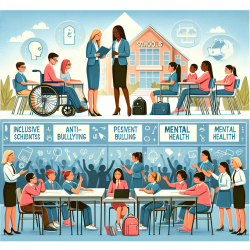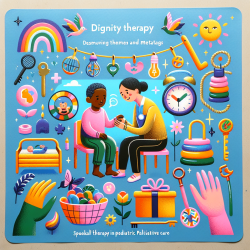The Multi-Tiered System of Support (MTSS) is a comprehensive framework designed to provide academic, behavioral, and social-emotional interventions tailored to students' individual needs. By utilizing graduated tiers of support, MTSS aims to support the "Whole Child" through universal services (Tier 1), targeted supports (Tier 2), and intensive individualized interventions (Tier 3).
The Importance of MTSS in Bullying Prevention
Students with disabilities (SWD) are disproportionately affected by bullying. Research indicates that SWD experience higher levels of bullying victimization and perpetration compared to their non-disabled peers. This highlights the critical need for effective interventions that prevent bullying, particularly for SWD.
The study titled "Developing a Multi-Tiered System of Support-Based Plan for Bullying Prevention Among Students with Disabilities" explores teacher perspectives on using MTSS to prevent bullying. The findings emphasize the importance of educating teachers on implementing MTSS-based strategies that are inclusive of SWD.
Key Themes from the Research
- Teacher Perceptions: Educators recognize the need for inclusive bullying prevention plans that consider SWD.
- Stakeholder Identification: Teachers identify key stakeholders such as parents, school staff, and students as critical in preventing bullying.
- Challenges and Solutions: Implementing MTSS-based plans requires addressing potential challenges such as limited resources and stakeholder engagement.
Implementing MTSS-Based Bullying Prevention Strategies
The study outlines several strategies for implementing MTSS-based bullying prevention plans at different levels:
Tier 1: School-Level Interventions
- Create a Positive School Climate: Use school climate surveys to identify areas for improvement and develop interventions that foster a supportive environment for all students.
- Educate on Disabilities: Increase awareness about different disabilities to reduce stigma and promote understanding among students.
Tier 2: Classroom-Level Interventions
- Focus on Social-Emotional Skills: Implement programs that enhance students' social skills and emotional regulation to reduce peer aggression.
- Collaborative Learning: Use cooperative learning groups to ensure SWD are included and supported in classroom activities.
Tier 3: Individual-Level Interventions
- Address Specific Behavioral Issues: Use Functional Behavioral Assessments (FBA) and Behavioral Intervention Plans (BIP) to tailor interventions for individual students.
- Enhance Self-Advocacy Skills: Empower SWD to advocate for themselves by developing their confidence and self-determination.
The Role of Educators in Bullying Prevention
Teachers play a crucial role as "key agents of change" in preventing bullying. The research highlights the need for professional development and training focused on supporting SWD. By equipping teachers with the necessary skills and knowledge, schools can create inclusive environments where all students feel safe and supported.
Encouraging Further Research
This study provides valuable insights into the implementation of MTSS-based bullying prevention strategies. However, further research is needed to explore the effectiveness of these interventions across different school contexts. Educators are encouraged to engage in ongoing professional development and collaborate with researchers to refine and improve bullying prevention efforts.
To read the original research paper, please follow this link: Developing a Multi-Tiered System of Support-Based Plan for Bullying Prevention Among Students with Disabilities: Perspectives from General and Special Education Teachers During Professional Development.










